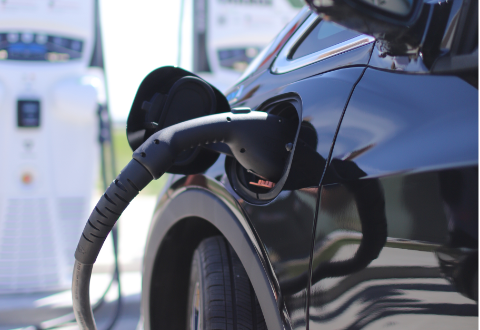Charging your electric vehicle

Industry experts estimate that electric vehicle (EV) sales in the U.S. will reach 2.5 million by 2028. With the boost in EV demand provided from federal tax credits, there is a mad dash to build out charging infrastructure across the country. While current vehicle models now average 200-300 miles of range on a full charge, drivers want to be reassured there is a place nearby to charge up if and when they need to.
Today, there are more than 68,000 public charging stations across the country – with nearly 375 in Iowa alone – including 40 of MidAmerican Energy’s direct current (DC) fast chargers. However, many EV owners charge at home overnight.
Keep reading below to learn about the different types of EV chargers and how to charge at home or on the road.
Installing a charger at home
Before you begin installing a private charger:![[icon] Two red speech bubbles](https://www.midamericanenergy.com/media/images/icon_speech-bubble.png)
- Consult your electrician about assessing your current electric service line and panel for capacity to serve an electric vehicle (EV) charging station. You may need upgrades prior to installing EV charging equipment.
![[icon] Red phone ringing](https://www.midamericanenergy.com/media/images/icon_telephone-ringing.png)
- Contact MidAmerican at 888-427-5632 before installing a charging station at your home or business. A MidAmerican representative will:
- Determine if your electric facilities need to be upgraded. If upgrades are needed, the property owner may need to pay a portion of costs for the upgrade.
- Prepare a facility upgrade estimate, if necessary. If you approve the estimate, MidAmerican will complete any necessary facility upgrades.
- Notify you when it is safe to install and operate your new charging station.
![[icon] Red clipboard with checklist and dollar sign](https://www.midamericanenergy.com/media/images/icon_checklist-clipboard-dollarsign.png)
- Count the cost of charging equipment. Pricing may vary depending on the configuration of your home’s or business's electrical circuits, local code requirements and the type of equipment installed. Be sure to take advantage of federal tax credits that are offered for hardware and installation, which could credit you up to $1,000 for your home or business EV charger. Plus, there may be additional state incentives to help offset the cost of charging equipment.
- Locate where you will install your charger. Residential equipment is commonly installed in garages, but outdoor installation is also safe, even in the rain! Outdoor installations will need outdoor-rated equipment and may require additional installation completed by an electrician.
![[icon] Red battery with low charge](https://www.midamericanenergy.com/media/images/icon_low-battery.png)
- Know when to use your EV charger. MidAmerican does not offer special rates for vehicle charging. However, we do offer optional residential Time-of-Use rates, which may provide savings to customers who have the ability to shift significant usage, including electric vehicle charging, to nights and weekends. If you are on Time-of-Use rates, the best time to charge a vehicle is at night or on weekends during off-peak hours, when electricity demand and costs are lowest.
Level 1, 2 or 3
There are three levels of EV chargers. Most EV drivers who charge their vehicle at home use a Level 1 or Level 2 charger, while Level 3 is used most at public charging stations like our DC fast-charging network.
| Level | Outlet | Charge time |
| Level 1 | 120-volt | 8-12 hours |
| Level 2 | 240-volt | 4-8 hours |
| *Level 3 (direct current or DC) | 480-volt | 30-45 minutes |
*MidAmerican has 150 kW and 50 kW Level 3 DC fast chargers, which allow for charging in 20 and 40 minutes, respectively.
In the near future, North American Charging Standard (NACS) chargers will be the new industry standard, as nearly all vehicle manufacturers have committed to making the switch. This is the charging method for all Tesla vehicles in the U.S. but will be compatible with Tesla and non-Tesla drivers alike. To ensure you use the correct plug, be sure to check your vehicle’s owner manual, whether you are charging at home or at a public charger. You may need an adapter when charging with public chargers like ours. Our chargers are compatible with Combined Charging System (CCS) and CHArge de MOve (CHAdeMO) connectors, so for electric vehicles like a Tesla, an adapter would be needed.

connector

connector

connector

connector